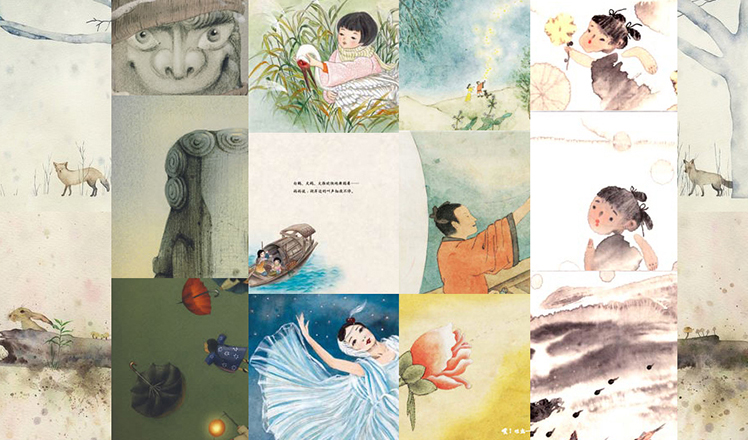Fanning the flames of tradition
Updated: 2016-07-16 04:09
By XU JUNQIAN in Shanghai(China Daily USA)
|
||||||||
Humble beginnings
Wang first started making folding fans 35 years ago at a State-owned fan factory in Suzhou. Fascinated by the complex procedures involved in fan-making — he said that it takes roughly 300 steps to complete a fan — Wang dived into the craft immediately after he graduated from school and has since "been addicted to the magic".
"It's hardly possible for one to excel in all the steps. But I would like to learn as much as possible within my lifetime," he said.
One of Wang's most notable achievements is reviving the craft of Ming Dynasty-style, gold-painted, paper-cover folding fans. Wang believes that this particular type of fan represents the highest aesthetics of folding fans. Indeed, its market price reflects this as well — the cost of such a fan starts from about 60,000 yuan.
"But prices are only for amateurs to learn its value. Making fans is the only thing that I am capable of and interested in. All I want to do is make real Chinese fans," said Wang.
Wang left the factory and started his eponymous brand in 2000 when the decade-old fan factory was plagued by low efficiency levels and had few orders coming through.
When Wang decided to set up his own business, the folding fan market was still in a nascent stage. Today, his studio has a score of workers and students who help produce thousands of fan ribs and tens of thousands of fan covers every year. Most of the fans are made to order.
While the studio's output is still low compared to an industrialized production line, collectors and investors are more than ready to wait.
"These fans are like Hermes bags. Goods things are always worth waiting," said a customer at Wang's studio.
Young blood, old industry
A growing number of young people have started to flow into this industry and are, somewhat surprisingly, making a good living despite the competition.
Li Jing is one such person. The 30-year-old native of Jiaxing, a neighboring town of Suzhou, said he was born "an old soul" and has been interested in Chinese traditional opera and its props ever since he could read and understand the ancient Chinese language used in such performances.
With little chance to sing opera on and off the stage — he said that his strict parents never allowed him to — he took a detour "to indulge in the things he loves". He later became a self-taught moon-shaped fan maker while majoring in business management in college.
A widely-used prop for female characters in traditional Chinese opera, moon-shaped fans generally have a silk cover and frames made from bamboo or wood. Li's fans, however, feature a twist. His creations, which are made using recycled materials from old furniture, jewelry and accessories and are sold for thousands of yuan, have been quickly snapped up by collectors.
"The fact that rich Chinese shop for luxury bags and fancy cars doesn't mean they have bad taste. It could also mean that those foreign brands have found a way to cater to their contemporary needs. That happens to be something Chinese craftsman are poor at," said Li.
His bright and well-decorated studio is hidden in an alley in downtown Suzhou. Like his fans, the studio is quaint but features a modern touch.
"I believe the penchant for traditional things is deeply rooted in almost everyone. As a craftsman, I feel a need to bring out this inclination in people and to make tradition more accessible," said Li.
"That is also why every period in history needs its own craftsman, despite the fact that there is already so many masters ahead of us."
xujunqian@chinadaily.com.cn
Bo Yimeng contributed to this story.
- 8-year-old boy gains 11kg to save father
- China rebuts claim it sank Vietnamese fishing boat
- China on high alert as floods kill 237
- What I want is a healthy grandson, so I will try anything I can
- China calls on US, Japan to stop twisting the facts
- Girl suffers sibling rivalry disorder after younger brother's birth

 Ten photos from around China: July 8-14
Ten photos from around China: July 8-14
 The only surviving panda triplets weaned from milk
The only surviving panda triplets weaned from milk
 First sea-air emergency drill held near Sansha
First sea-air emergency drill held near Sansha
 Truck attack in Nice as France marks national day
Truck attack in Nice as France marks national day
 Picture Chinese stories: 10 illustration books you can't miss
Picture Chinese stories: 10 illustration books you can't miss
 Theresa May: New Iron Lady in Downing Street
Theresa May: New Iron Lady in Downing Street
 Large amount of sea grass besieges Qingdao
Large amount of sea grass besieges Qingdao
 Monks seek tranquility inside lotus ponds
Monks seek tranquility inside lotus ponds
Most Viewed
Editor's Picks

|

|

|

|

|

|
Today's Top News
Ministry slams US-Korean THAAD deployment
Two police officers shot at protest in Dallas
Abe's blame game reveals his policies failing to get results
Ending wildlife trafficking must be policy priority in Asia
Effects of supply-side reform take time to be seen
Chinese State Councilor Yang Jiechi to meet Kerry
Chinese stocks surge on back of MSCI rumors
Liang avoids jail in shooting death
US Weekly

|

|







